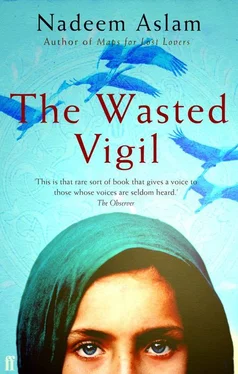Nadeem Aslam - The Wasted Vigil
Здесь есть возможность читать онлайн «Nadeem Aslam - The Wasted Vigil» весь текст электронной книги совершенно бесплатно (целиком полную версию без сокращений). В некоторых случаях можно слушать аудио, скачать через торрент в формате fb2 и присутствует краткое содержание. Год выпуска: 2009, Издательство: Faber and Faber, Жанр: Современная проза, на английском языке. Описание произведения, (предисловие) а так же отзывы посетителей доступны на портале библиотеки ЛибКат.
- Название:The Wasted Vigil
- Автор:
- Издательство:Faber and Faber
- Жанр:
- Год:2009
- ISBN:нет данных
- Рейтинг книги:4 / 5. Голосов: 1
-
Избранное:Добавить в избранное
- Отзывы:
-
Ваша оценка:
- 80
- 1
- 2
- 3
- 4
- 5
The Wasted Vigil: краткое содержание, описание и аннотация
Предлагаем к чтению аннотацию, описание, краткое содержание или предисловие (зависит от того, что написал сам автор книги «The Wasted Vigil»). Если вы не нашли необходимую информацию о книге — напишите в комментариях, мы постараемся отыскать её.
The Wasted Vigil — читать онлайн бесплатно полную книгу (весь текст) целиком
Ниже представлен текст книги, разбитый по страницам. Система сохранения места последней прочитанной страницы, позволяет с удобством читать онлайн бесплатно книгу «The Wasted Vigil», без необходимости каждый раз заново искать на чём Вы остановились. Поставьте закладку, и сможете в любой момент перейти на страницу, на которой закончили чтение.
Интервал:
Закладка:
Nothing is being done to captured terrorists that wasn’t done to the interrogators themselves. Nothing the body can’t recover from.
The crate is the size of a telephone booth three-quarters sunk into the lake bed. The small amount of air in each of the hundreds of bottles will be enough to lift the entire bundle to the surface once they have managed to loosen some of the lake’s grip. The desire of air to meet air will do the rest. But it’s too firmly embedded and one by one they surge up to the surface to replenish their lungs, inhaling noisily when they emerge into the air. Bubbles like loops of chains around their necks. From a minaret somewhere in the distance comes the call to worship, the muezzin summoning the faithful to the mosque five times every day. Allah is an insecure deity, he can’t help but remark to himself as he gets ready to go back down. Dead leaves from the surface sticking to his face and shoulders like a poultice.
The low bass of the depth is still in his ears. The hum from inside a grave. Before returning to the depths he looks around carefully. Remembering something his father had once quoted. We in this country, reads the speech that President Kennedy did not live to deliver in Dallas in November 1963, are — by destiny rather than by choice — the watchmen on the walls of world freedom .
‘IS IT TRUE THAT YOU AMERICANS shot dead one of your presidents because he was a Muslim?’
Together it has taken David and Casa five hours to stitch the canoe.
‘A Muslim?’
‘Yes. Ibraheem Lankan.’
‘His name was Abraham Lincoln.’
‘He wasn’t a Muslim?’
‘Who told you he was?’
He just shakes his head and looks away.
The edges of the lake are green with the high grass of March, the air above the jade and gold water alive with insects. ‘I’ll take you out to the other side of the lake when the canoe is built,’ David had told Marcus. The boat the family had once owned has been eaten away by insects. It lies under the jacaranda tree, covered by its weightless blossom. The wood almost hollow, brittle as cinnamon sticks or dried-up orange peel. Asking David to remain near by, Marcus has attempted to swim in the lake but the missing hand, he says, makes him feel like a bird trying to get airborne with one of its wings clipped. So he remains in the shallows, the beard running in milky streaks over his chest.
A trickle of blood flows out from the base of David’s thumb and slides onto Casa’s wrist. Casa had become distracted and let the blade slip, sending it into David’s flesh, the small sound of pain alerting him to the wound.
On the path beside the lake and then along the high wall of the house that is covered with a vine like a child’s directionless scrawl — a young woman has arrived on foot from Usha, Casa’s eyes following her before she disappears towards the front door.
David looks up from the cut in his skin and follows his gaze, catching the last of the bright veil. A bowl of turquoise liquid flung into the air.
The distraction, the fascination, is short-lived however — the young man has averted his eyes. David read somewhere that if a Muslim doesn’t look at a beautiful woman here on earth, Allah will allow him to possess her in Paradise.
‘What was that?’
But he seems abashed, having been caught displaying emotion. ‘Nothing,’ he says somewhat icily, his eyebrows gathered.
‘Shall we go and see who she is?’
‘Who?’
To not know anything about women is a sign of decency in these lands. Muslim scholars to this day debate the permissibility of a second ‘deliberate’ glance as opposed to the first ‘inadvertent’ one.
David resists the temptation to say more.
The boy is serious and brisk, with his own sense of the maladroit, but untested virtue is no virtue at all, and it seems clear to David that his ideas have never been put to the test.
*
Almost as tall as a harp, the girl leans against the painted wall.
Marcus is preparing tea, and Lara sits at the kitchen table looking at Dunia, the twenty-two-year-old daughter of the doctor in Usha, the young teacher who is in charge of the small school. Thirteen days ago one of her pupils had tied the string of beads around Lara’s neck while she was waiting for Marcus at the doctor’s house.
‘Today is the anniversary of a saint, so there’s no school. I thought I’d come see you before you went back to Russia.’
Lara touches the beads, the token of a child’s affection. Something is there in children and the young that makes them trust others. The horrors of life haven’t yet perfected their aim. At times this seems to hold true even here in Afghanistan, in this land torn as though by God’s own hatred. The young everywhere, she suspects, would prefer to live in houses that consist only of doors. And Lara had detected it in Marcus also, in the way he welcomed her into his house, though he has seen the worst that life can offer. With him it’s not due to age, it’s his character.
Dunia takes the cup from Marcus with a smile. There is a dish containing dry white mulberries. Four years earlier when the doctor had arrived from Kabul to take over the practice here, the girl’s trimmed hair could have caused a scandal, but the situation was contained with the lie that she had had typhoid recently, that the hair had fallen out but was now in the process of growing back.
‘Before I was born,’ she tells Lara, ‘an aunt of mine used to work at the perfume factory out there. My father says the money she brought home as wages used to be fragrant.’
‘Has your father returned from his trip to Kabul?’ Marcus asks.
‘No. The day after tomorrow.’
‘He took your brother with him?’
Lara knows about the brother, the young man who stole objects from the house to feed his addiction to heroin, trying to take off his sister’s bangles while she slept.
The girl nods. ‘They say a new clinic has opened there. He could hardly walk when they left. I wished he would stand up straight, as correctly as possible, because I didn’t want Satan to make fun of Allah’s creations.’
‘I hope he’ll make a full recovery.’ Marcus places his hand on her head, an Asian elder person’s gesture of love towards someone young.
Casa enters at this point and greets them all courteously. Lara notices how Dunia’s self seems to withdraw, vacating the room and disappearing into her body. Her face slightly lowered. Women in this country are still anxious even though the Taliban are gone.
He says he has arrived to ask for a pair of scissors. ‘Something strong enough to snip this.’ He indicates the small piece of birch bark that he has brought with him like a letter.
‘I thought you were managing perfectly well with the blades and things you already have out there,’ Marcus says, ‘but let’s see if I can find something.’ He produces an old pair of scissors whose cutting edges are uneven because Qatrina used it to clip the nibs of pens for calligraphy.
When Dunia asks Lara — not him — about the bark, in a tentative lowered voice, he moves forward and places it before Lara, the gold-like side upwards. ‘I am building a boat.’
‘Birch bark.’ There is something experimental about the girl’s smile. ‘They found rolled-up pieces of it here in this region, stored in clay jars. The oldest known Buddhist texts were written on them.’ She has been looking at Casa but now — suddenly remembering herself — turns her face to Lara and Marcus.
‘The discourses of the Buddha,’ Marcus nods. ‘Among them the Rhinoceros Horn Sutra. The clay jars preserved them otherwise they would have rotted away over the two thousand years.’
‘I didn’t know they were that old,’ says Dunia.
Читать дальшеИнтервал:
Закладка:
Похожие книги на «The Wasted Vigil»
Представляем Вашему вниманию похожие книги на «The Wasted Vigil» списком для выбора. Мы отобрали схожую по названию и смыслу литературу в надежде предоставить читателям больше вариантов отыскать новые, интересные, ещё непрочитанные произведения.
Обсуждение, отзывы о книге «The Wasted Vigil» и просто собственные мнения читателей. Оставьте ваши комментарии, напишите, что Вы думаете о произведении, его смысле или главных героях. Укажите что конкретно понравилось, а что нет, и почему Вы так считаете.












